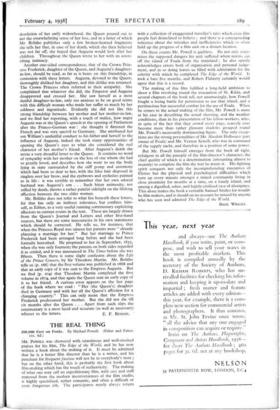THE REAL THING
MR. POWELL was showered with unanimous and well-merited praises for his film, The Edge of the World, and he has now written a book about the making of it. It must be admitted that he is a better film director than he is a writer, and his penchant for_frequent facetiae will not be to everybody's taste ; but on the other hand, this is probably the first book about film-making which has the touch of authenticity. The making of what one may call an expeditionary film, with cast and staff removed from the modern inconveniences of the film studio, is highly specialised, rather romantic, and often a difficult or even dangerous job. The participants nearly always return
with a collection of exaggerated traveller's tales which even film people feel disinclined to believe ; and there is a corresponding reticence about the mistakes and inefficiencies which so often hold up the progress of a film unit on a distant location.
On these counts Mr. Powell is guiltless. He not only mini- mises the supposed dangers his unit suffered when storms cut. off the island of Foula from the mainland ; he also openly acknowledges errors both of organisation and personal judge- ment, and in so doing leaves us filled with .admiration for the celerity with which he completed The Edge of the World. It took a bare five months, and Robert Flaherty certainly would agree that this is a record.
The making of this film fulfilled a long-held ambition to shoot a film revolving round the evacuation of St. Kilda, and several chapters of the book tell, not unamusingly, how Powell fought a losing battle for permission to use that island, and a pertinacious but successful combat for the use of Foula. When he comes to the actual making of -the film, Mr. Powell is more at his ease in describing the actual shooting, and the weather conditions, than in his presentation of his fellow-workers, who, in spite of the fact that they crowd every page, scarcely ever become more than rather pleasant shadows grouped round Mr. Powell's necessarily domineering figure. The only excep- tions are the strong personalities of Mr. Alasdair Holbourn (part owner of Foula) and Mr. Vernon Sewell, who was in command of the supply yacht, and therefore in a position of some power.
But Mr. Powell himself emerges from the book all right, refulgent in all the panoply of the film-director's character, the chief quality of which is a determination (amounting almost to insanity) to complete the film the way he wants it. His fighting spirit conquers not only the incomprehending executives of Elstree but the physical and psychological difficulties which turn up every minute amongst a mixed community living in close proximity for months at a time, on a lonely island, and among a dignified, sober, and highly-civilised race of aborigines. This alone makes the book a veritable Samuel Smiles for would- be film makers, and it should on no account be missed by anyone who has seen and admired The Edge of the World.
BASIL WRIGHT.














































 Previous page
Previous page